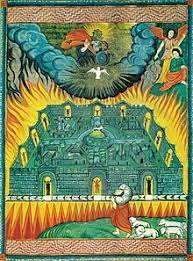

Book by Charles Dickens
City of God, by Augustine
Jerusalem Above, Jerusalem Below
For the message of the cross is foolishness to those who are perishing, but to us who are being saved it is the power of God.
|
![]()

by Scott Hubbard, Editor, desiringGod.org
August 3, 2021
Once upon a time, in a world without cars and screens, people had no choice but to live where they lived.
If their home was in the northeast part of town, they worked and worshiped in the northeast part of town. They knew dozens of neighbors by name because, well, they said their names a lot. Entertainment was a family or community affair: conversation around the dinner table, games with neighborhood kids, festivals at the park. More often than not, they recognized the contours of the land, even if their livelihood didn’t depend on it. They knew where the stream branched and what kind of maple stood in the backyard.
The newspaper offered the nearest doorway to the wider world, yet even the news was shaped by home. It arrived in rolls on doorsteps, the city name printed on top, local stories filling its pages. For them, “the news” largely happened in the place they lived, among people they recognized.
An old proverb puts it quaintly: “The goat must browse where she is tied.” Humans in the past, finding themselves bound to a local place and local people, lived and laughed and loved there. They spent their seventy or eighty years within limits that would feel to us remarkably narrow. They had to; the goat must browse where she is tied.
Today, however, many might respond, “Not if the goat has a smartphone.”
The picture painted above is not meant to be nostalgic. Sin, sorrow, and alienation laced the analog world before they laced the digital world. But questions still bear asking: How did we get to the point where we know our neighbors on social media better than our neighbors next door? Why are we often more aware of the happenings in the Capitol than the happenings in our church or community? And what are the consequences of browsing where we’re not tied — of living where we aren’t?
In his novel Jayber Crow, Wendell Berry’s narrator describes the effect of the highway in mid-twentieth-century rural places: “The interstate cut through farms. It divided neighbor from neighbor. It made distant what had been close, and close what had been distant” (281). The information superhighway has done something similar: invisibly, it has paved four lanes between neighbors, and even between family members. It has made distant places close, and close places distant.
“Many of us strain our eyes toward the ends of the earth — and miss this little patch of earth called here.”
Used rightly, knowledge of distant people and places can serve us; news from elsewhere can help us live more wisely here. Yet it can also make us fools: “The discerning sets his face toward wisdom,” Solomon tells us, “but the eyes of a fool are on the ends of the earth” (Proverbs 17:24). Many of us strain our eyes toward the ends of the earth — and miss this little patch of earth called here. Like a man who mistakes binoculars for eyeglasses, we often know more about distant matters than about the needs, struggles, joys, and griefs of the ordinary people nearby.
Easily, perhaps without our even noticing it, screens exile us. At home online, we become strangers at home.
We might call our attempt to live both there and here “multiplacing,” a cousin of the famous myth of multitasking. Multitasking, we now know, is just a clever name for a common illusion. We never really do two tasks at once but instead switch back and forth, eroding both focus and productivity in the process. In trying to handle two tasks simultaneously, we handle neither as well as we could.
So with multiplacing. Just as we cannot focus on two tasks at once, neither can we live in two places at once. Time and attention are zero-sum games. The more time we spend with faraway friends, the less time we spend with nearby neighbors. The more attention we give to national or international news, the less attention we give to local news. The more our eyes rest on the ends of the earth, the less they rest on our spouses, children, and local church.
The digital world can trick us into thinking we can split these finite selves. But in trying to live both here and there, giving our best attention to distant places while inhabiting a local place, we end up living nowhere well.
We likely all know the feeling of being with someone whose phone seems strapped to his hand. Every minute or so, his eyes dart down, his thumb scrolls, his laughter and uhuhs go on autopilot. His body is here, his mind there — but where is he? Nowhere at all.
So far, we have been reckoning with realities of creation. In the beginning, God “determined allotted periods and the boundaries of [our] dwelling place” (Acts 17:26). He set our bodies in a local place among local people, deciding that we should live and move and have our being here and not there. He holds our lot (Psalm 16:5).
We learn the same lesson from redemption, even though, in a sense, the redeemed do live in two places simultaneously. Paul greets the Philippian Christians, “To all the saints in Christ Jesus who are at Philippi . . .” (Philippians 1:1). As with all Christians everywhere, the Philippians had been “raised up with [Christ] and seated . . . with him in the heavenly places in Christ Jesus” (Ephesians 2:6). They lived “in Christ.”
Yet they also lived “at Philippi.” Life in Christ did not remove them from their city, but sent them into it: alert to its dangers (Philippians 3:2), awake to its neighbors (Philippians 4:5), alive to its God-given pleasures (Philippians 4:8), and especially aware of its fellow Christ-worshipers (Philippians 2:1–2).
In other words, spiritual life there shaped and animated physical life here. Their identity in Christ took form in the streets and stores, homes and halls, highways and byways of Philippi. In creation, God determined that Philippi would be their dwelling place; in redemption, he filled Philippi with living, local images of his Son. Living where they were, then, was a matter not only of creational necessity, but of redemptive mission.
Redeemed humans live not only in Christ, but in Christ at Chicago, Glasgow, Nairobi, St. Petersburg, Seoul. Redemption, like creation, happens here.
G.K. Chesterton, writing just after the invention of the car, and just before the appearance of the screen, observed,
It is inspiring without doubt to whiz in a motor-car round the earth, to feel Arabia as a whirl of sand or China as a flash of rice-fields. But Arabia is not a whirl of sand and China is not a flash of rice-fields. They are ancient civilizations with strange virtues buried like treasures. If we wish to understand them it must not be as tourists or inquirers, it must be with the loyalty of children and the great patience of poets. (Heretics, 51–52)
Today, of course, we whiz past not only foreign places in our cars, but local places on our screens. But if we wish to start living where we are — to understand and not just inhabit our homes — we too will need something of the loyalty of children and the great patience of poets.
Children are instinctively loyal: dad doesn’t need to be awesome; he just needs to be theirs. Poets are relentlessly attentive: they see marvels in the mundane. Most of us, of course, are no longer children and not yet poets. But with God’s help, we can begin cultivating the same loyal, attentive presence to the ordinary people and places all around us.
And if we do, we may discover just how wild and wonderful here really is.
“O Lord, how manifold are your works!” (Psalm 104:24), sings one of Scripture’s most childlike poets, millennia before cars or trains or planes or screens could show him the height and depth of those works. Where, then, was he looking? What inspired such praise? The clouds and dirt and hills and rivers and animals and image-bearers adorning the place he called home.
“Living where we are makes the world big again.”
The psalmist’s world was, in one sense, smaller than our own; in a more important sense, it was far larger. By living as a limited human, blessedly confined to one space and time, he saw much more than many of us. Who has eyes today for such Psalm 104 marvels? We walk with heads down — incurvatus in smartphone — trotting the globe on our devices while trampling flowers at home.
Living where we are makes the world big again. It awakens us to the everyday wonders in our homes, neighborhoods, and churches. It reminds us that the most exciting and urgent matters happen not on screens, but in the successes and struggles of the ordinary brothers and sisters in our small group. It frees us to finally explore the galaxy of glories found here, in this small frame of God’s creation, where the heavens declare his glory, creation chants his praise, and immortal souls live and walk and laugh and weep.
So live where you are: not because home is the most remarkable place on earth, but because God placed you there. And for those with eyes to see, it is full of his wonderful works.
What excited me the most about Scott Hubbard’s article was the clarity of his understanding of our U.S. history in the past century. I was born in 1932, during the Great Depression, followed WW2 on the radio, I almost got drafted to serve in the Korean War, I followed the Viet Nam debacle and all the related political issues. Well do I remember Nuclear Testing, the Arms Race, the Cold War, M.A.D., the Sexual Revolution, the Summer of Love, the Jesus Movement…the Birth of the Internet in 1995… Anyone person born since 2000 ain’t seen nuthin’! Scott is not among those “Left Behind” obviously. I would love to drop by his office and compare notes. We are 2000 miles apart and my flying carpet has not yet arrived from Persia (ha!). There is something special about one's hometown as Scott notes. I have fond memories of Shoshone, Idaho! When God saves any person, surely He preserves something of our life's infrastrucure? If He didn't we'd be strangers in heaven.
How Shall We Sing the Lord’s Song?By the waters of Babylon, On the willows there For there our captors How shall we sing the Lord’s song If I forget you, O Jerusalem, | Let my tongue stick to the roof of my mouth, Remember, O Lord, against the Edomites how they said, “Lay it bare, lay it bare, O daughter of Babylon, doomed to be destroyed, Blessed shall he be who takes your little ones (Psalm 137)
|
To me an important project is one’s weltanschauung (world view). Few Christians I know have worked out a sound world view concerning Origins.
Few also have thought through Eschatology.
These are major handicaps which will make one’s move from the first Jerusalem to the second a bit of a rough ride.
The Rapture of the Church, now imminent, is a fixed date on God’s calendar. But He hasn’t told us when!
There are apparently two ultimate cities where we can live--one is on earth and the other is in heaven--simplistically speaking.
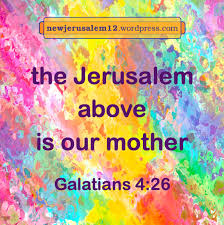 They are symbolized by being labeled “Jerusalem below” and “Jerusalem above” in the letter of Paul to the Galatians.
They are symbolized by being labeled “Jerusalem below” and “Jerusalem above” in the letter of Paul to the Galatians.
Tell me, you who desire to be under the law, do you not hear the law? For it is written that Abraham had two sons: the one by a bondwoman, the other by a freewoman. But he who was of the bondwoman was born according to the flesh, and he of the freewoman through promise, which things are symbolic. For these are the two covenants: the one from Mount Sinai which gives birth to bondage, which is Hagar—- for this Hagar is Mount Sinai in Arabia, and corresponds to Jerusalem which now is, and is in bondage with her children— but the Jerusalem above is free, which is the mother of us all. For it is written:
“Rejoice, O barren,
You who do not bear!
Break forth and shout,
You who are not in labor!
For the desolate has many more children
Than she who has a husband.”Now we, brethren, as Isaac was, are children of promise. But, as he who was born according to the flesh then persecuted him who was born according to the Spirit, even so it is now. Nevertheless what does the Scripture say? “Cast out the bondwoman and her son, for the son of the bondwoman shall not be heir with the son of the freewoman.” So then, brethren, we are not children of the bondwoman but of the free. (Galatians 4:21-31)
Every one who knows Jesus today (regardless of one’s level of spiritual maturity) is already a citizen of the heavenly city. The two cities are connected through hidden portals which are everywhere. If you die today, and you know Jesus, a portal will open for you directly home to New Jerusalem. You'll get a new body on the way, and enter the heavenly city through the Bema Gate. City Life in New Jerusalem will be spectacular byond belief. The Half Has Not Been Told! Plenty of Open Space, Fifty Miles of elbow room!
“Positionally” you're there already if you had your new body now on you’d see all the gardens and the angels too! But until we get our new bodies waiting to be called home by the Bridegroom we are indeed buffeted by the city below. Abraham (by the way) saw the eternal city 4000 years and longed to go there (see Hebrews 11)!
Chuck Missler called attention to the absence of Jesus from our planet for two millenia. He noted that our Lord had gone to the Father's house to prepare a room for His Bride, in accordance with Jewish wedding protocol. "Do not let your hearts be troubled. You believe in God; believe also in me. My Father’s house has many rooms; if that were not so, would I have told you that I am going there to prepare a place for you? And if I go and prepare a place for you, I will come back and take you to be with me that you also may be where I am." (John 14:1-3), Then Chuck commented that no decent Jewish man would leave his bride stranded down in a hostile place indefinitely. He'd surely come and snatch her away in the nick of time. He was talking about the Greek word "harpazo" usually translated "rapture."
“Therefore we also, since we are surrounded by so great a cloud of witnesses, let us lay aside every weight, and the sin which so easily ensnares us and let us run with endurance the race that is set before us, looking unto Jesus, the author and finisher of our faith, who for the joy that was set before Him endured the cross, despising the shame, and has sat down at the right hand of the throne of God...For you have not come to the mountain that may be touched and that burned with fire, and to blackness and darkness and tempest, and the sound of a trumpet and the voice of words, so that those who heard it begged that the word should not be spoken to them anymore. (For they could not endure what was commanded: “And if so much as a beast touches the mountain, it shall be stoned or shot with an arrow.” And so terrifying was the sight that Moses said, “I am exceedingly afraid and trembling.”)
But you have come to Mount Zion and to the city of the living God, the heavenly Jerusalem, to an innumerable company of angels, to the general assembly and church of the firstborn who are registered in heaven, to God the Judge of all, to the spirits of just men made perfect, to Jesus the Mediator of the new covenant, and to the blood of sprinkling that speaks better things than that of Abel. See that you do not refuse Him who speaks. For if they did not escape who refused Him who spoke on earth, much more shall we not escape if we turn away from Him who speaks from heaven, whose voice then shook the earth; but now He has promised, saying, “Yet once more I shake not only the earth, but also heaven.” Now this, “Yet once more,” indicates the removal of those things that are being shaken, as of things that are made, that the things which cannot be shaken may remain. Therefore, since we are receiving a kingdom which cannot be shaken, let us have grace, by which we may serve God acceptably with reverence and godly fear. For our God is a consuming fire.” (Hebrews 12)
| The Greek word harpazo, “to snatch away, to catch up” is said of the act of the Spirit of the Lord in regard to Philip in Acts 8:39; of Paul in being "caught" up to paradise, 2 Corinthians 12:2,4; of the Rapture of the saints at the return of the Lord, 1 Thessalonians 4:17; of the rapture of the man child in the vision of Revelation 12:5. This verb conveys the idea of force suddenly exercised, as in Matthew 11:12, "take (it) by force;" Matthew 12:29, "spoil" (some mss. have diarpazo here); in Matthew 13:19 , RV, "snatcheth;" for forceful seizure, see also John 6:15; 10:12,28,29; Acts 23:10; in Jude 1:23, RV, "snatching." See PLUCK , PULL , SNATCH , TAKE (by force). (Vines) |
In our present bodies (only 3 dimensions plus linear time), we are very limited and only see through a glass darkly. The revealing, or unveiling (apokalupsis) of Jesus includes your unveiling as well as mine.
Behold what manner of love the Father has bestowed on us, that we should be called children of God! Therefore the world does not know us, because it did not know Him. Beloved, (agapetos) now we are children of God; and it has not yet been revealed what we shall be, but we know that when He is revealed, we shall be like Him, for we shall see Him as He is. And everyone who has this hope in Him purifies himself, just as He is pure.
For we know in part and we prophesy in part. But when that which is perfect has come, then that which is in part will be done away. When I was a child, I spoke as a child, I understood as a child, I thought as a child; but when I became a man, I put away childish things. For now we see in a mirror, dimly, but then face to face. Now I know in part, but then I shall know just as I also am known.“ (1 Corinthians 13:9-12)
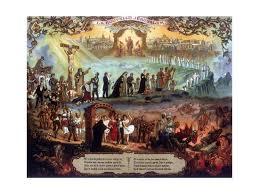 A grand picture of New Jerusalem is found at the end of the last book of the Bible:
A grand picture of New Jerusalem is found at the end of the last book of the Bible:
Then one of the seven angels who had the seven bowls filled with the seven last plagues came to me and talked with me, saying, “Come, I will show you the bride, the Lamb’s wife.” And he carried me away in the Spirit to a great and high mountain, and showed me the great city, the holy Jerusalem, descending out of heaven from God, having the glory of God. Her light was like a most precious stone, like a jasper stone, clear as crystal. Also she had a great and high wall with twelve gates, and twelve angels at the gates, and names written on them, which are the names of the twelve tribes of the children of Israel: three gates on the east, three gates on the north, three gates on the south, and three gates on the west. Now the wall of the city had twelve foundations, and on them were the names of the twelve apostles of the Lamb.
And he who talked with me had a gold reed to measure the city, its gates, and its wall. The city is laid out as a square; its length is as great as its breadth. And he measured the city with the reed: twelve thousand furlongs. Its length, breadth, and height are equal. Then he measured its wall: one hundred and forty-four cubits, according to the measure of a man, that is, of an angel. The construction of its wall was of jasper; and the city was pure gold, like clear glass. The foundations of the wall of the city were adorned with all kinds of precious stones: the first foundation was jasper, the second sapphire, the third chalcedony, the fourth emerald, the fifth sardonyx, the sixth sardius, the seventh chrysolite, the eighth beryl, the ninth topaz, the tenth chrysoprase, the eleventh jacinth, and the twelfth amethyst. The twelve gates were twelve pearls: each individual gate was of one pearl. And the street of the city was pure gold, like transparent glass. But I saw no temple in it, for the Lord God Almighty and the Lamb are its temple.
The city had no need of the sun or of the moon to shine in it, for the glory of God illuminated it. The Lamb is its light. And the nations of those who are saved shall walk in its light, and the kings of the earth bring their glory and honor into it. Its gates shall not be shut at all by day (there shall be no night there). And they shall bring the glory and the honor of the nations into it. But there shall by no means enter it anything that defiles, or causes an abomination or a lie, but only those who are written in the Lamb’s Book of Life.“ (Revelation 19:9-27)
This city is rightly called “the holy city.” She is likened to a virgin bride, the opposite of a harlot. At her worst, her counterpart, earthly Jerusalem, (Israel) is called the adulterous wife of Yahweh in Ezekiel Chapter 16. The city on earth's spiritual condition is said to have been worse than Sodom and Gomorrah.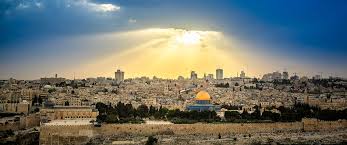
“For the love of Christ compels us, because we judge thus: that if One died for all, then all died; and He died for all, that those who live should live no longer for themselves, but for Him who died for them and rose again. Therefore, from now on, we regard no one according to the flesh. Even though we have known Christ according to the flesh, yet now we know Him thus no longer. Therefore, if anyone is in Christ, he is a new creation; old things have passed away; behold, all things have become new. Now all things are of God, who has reconciled us to Himself through Jesus Christ, and has given us the ministry of reconciliation, that is, that God was in Christ reconciling the world to Himself, not imputing their trespasses to them, and has committed to us the word of reconciliation. Now then, we are ambassadors for Christ, as though God were pleading through us: we implore you on Christ’s behalf, be reconciled to God. For He made Him who knew no sin to be sin for us, that we might become the righteousness of God in Him. (2 Corinthians 5:14-21)
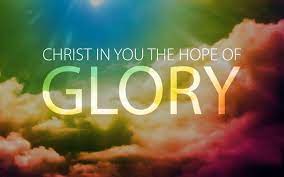
“There is no limit to what God can do through any man
|
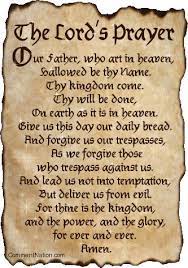
On Everlasting Destruction |
![]()
Notes by Lambert Dolphin
I recovered from a NDE in mid 2017 and have written about 700 articles since. They are free of course--and I do answer email.
The search engine on my site, ldolphin.org, works well, I use it all the time..

Email Lambert
Lambert Dolphin's Place (Home Page)
Lambert Dolphin's Original Web Site (1995)
Lambert's Personal Testimony
Newsletters by Lambert
678+ Articles since 2018 (Free. Help Thyself)
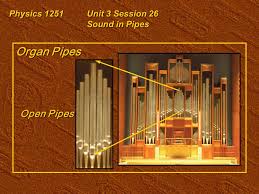
A Glorious Church
I Sing the Mighty Power of God
Jesus, The Light of the World
Pachelbel: Canon in D
Old Time String Band - I Bid You Goodnight
James Alan Shelton - Song for Greta
Gigantic Legless Cauldrons - Sodium Chloride
August 4, 2021, March 11, 2023.